Donor Impact Stories
VBGA is committed to supporting program participants to create a lifelong relationship with the natural world within the urban setting of Vancouver.
Read about how your donations impact!
Our work seeks to build an awareness and appreciation of biodiversity which ultimately may support finding solutions to environmental concerns and issues. Thanks to donors like you, we are able to continuously adapt our work to the ever-changing needs of program participants, whether responding to a global pandemic or integrating innovative new ways of teaching inspired by research, technology and other resources.
Importantly, we are guided by our recent public engagement research, which indicated that the Gardens are recognized as places of connection between people, community, plants and nature. Although different things brought participants together, there was a collective value around how the Gardens are places where memories are made.
-
+-Elizabeth Fletcher: A Legacy of Learning and Connection at VanDusen
A Family Gathering-place Across Generations
by Penny Williams
August, 2023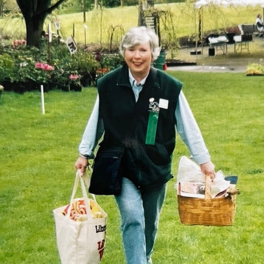 “It was all about learning and connection,” says Wendy Fletcher, reflecting on her mother’s long, passionate involvement with VanDusen Botanical Garden. Elizabeth Fletcher began taking her children to the Garden the year it opened, 1975, and she paid her last visit, again surrounded by family, in fall 2022. In between, she was a 40-year Garden Guide volunteer, a frequent Plant Sales volunteer, and a tireless Garden promoter at every opportunity.
“It was all about learning and connection,” says Wendy Fletcher, reflecting on her mother’s long, passionate involvement with VanDusen Botanical Garden. Elizabeth Fletcher began taking her children to the Garden the year it opened, 1975, and she paid her last visit, again surrounded by family, in fall 2022. In between, she was a 40-year Garden Guide volunteer, a frequent Plant Sales volunteer, and a tireless Garden promoter at every opportunity.Elizabeth was herself a skilled gardener. In 1977 she bought a bungalow with an overgrown double lot once owned by J. Henry Eddie (plant hybridizer and son of orchardist Henry M. Eddie). Through 30 years of stewardship, she rescued and nurtured its collection of Eddie varietals and developed another 350 sq. ft. of garden beds as well.
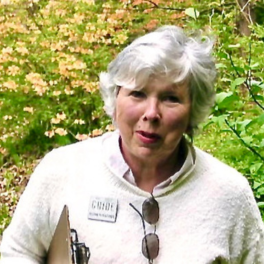 This experience, plus her 45 years as an elementary school teacher, fit perfectly with her role as a Garden Guide. When she gave a tour, she knew what she was talking about, and she knew how to talk about it. “She could read her audience and find common ground with them,” says Wendy. “She was never preachy and the tours were never static. She saw something new every time.”
This experience, plus her 45 years as an elementary school teacher, fit perfectly with her role as a Garden Guide. When she gave a tour, she knew what she was talking about, and she knew how to talk about it. “She could read her audience and find common ground with them,” says Wendy. “She was never preachy and the tours were never static. She saw something new every time.”Elizabeth’s relationship with the Garden ran deeper than its botany. “My mother had a learner’s mind. She always wanted to know more about her world.” Lifelong, Elizabeth pursued her passions for cooking, travel, volunteership, music, reading and art, both as a collector and artist herself. “The Garden fed that curiosity. She used the Library and signed up for workshops and courses.”
Woven through all this, a profound sense of connection. “The Garden has always been our family gathering-place,” says Wendy, “the place where we held family events, the place we visited with family members, friends and exchange students.”
Elizabeth also saw the Garden as an oasis, she adds. “Both for her personally, and for a whole community of like-minded people. It was a place not driven by commerce, where they could share their common interests. It was important to all of them that the VanDusen is a true botanical garden, not just a show garden.”
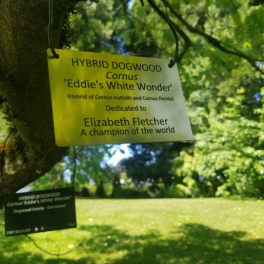 One last, and lasting, connection between Elizabeth Fletcher and the Garden: a tree adopted in her memory on May 12, 2023, just weeks after her passing. Fittingly, it is an Eddie’s White Wonder dogwood, the most famous cultivar developed by Henry M. Eddie and one of the heritage gems Elizabeth later revived on her bungalow’s double lot. Just as fittingly, you can look from that tree across Heron Lake to the Japanese red maple adopted in 1996 to honour Elizabeth’s parents.
One last, and lasting, connection between Elizabeth Fletcher and the Garden: a tree adopted in her memory on May 12, 2023, just weeks after her passing. Fittingly, it is an Eddie’s White Wonder dogwood, the most famous cultivar developed by Henry M. Eddie and one of the heritage gems Elizabeth later revived on her bungalow’s double lot. Just as fittingly, you can look from that tree across Heron Lake to the Japanese red maple adopted in 1996 to honour Elizabeth’s parents.The plaque on Elizabeth’s tree says it is dedicated to “A champion of the world.” Wendy, who wrote the words, points out their deliberate double meaning. “Champion. An achiever in the world, and an advocate for the world.”
Throughout her life, Elizabeth gave generously to support the Gardens she loved so much. Wendy has continued her family’s legacy, supporting VanDusen Botanical Garden by adopting a tree, and ensuring future generations can enjoy the Gardens that have been so important to her family.
“Every year,” says Milo Dron, Senior Development Officer, “VBGA needs to raise close to a million dollars to fund Garden collections, enhance our facilities, and help Vancouverites learn about the natural world. The Fletcher family are one of many community members who give what they can to support this mission.”
If the Gardens and environmental education are important to you, click here to donate today, or contact Milo Dron at mdron@vandusen.org or at (250) 397-0390 to learn how you can adopt a tree or choose other ways to support the Gardens.
-
+-Rae Warner - Speaker Series
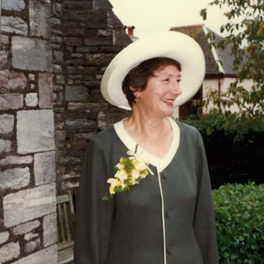 As a kind and thoughtful leader, Rae Warner was dearly loved by all her family, patients, colleagues and the many friends she touched in different circles throughout her life. With her curiosity and thirst for learning she later developed a passion for gardens, spending hours creating her own and volunteering for many different roles at VanDusen Botanical Garden.
As a kind and thoughtful leader, Rae Warner was dearly loved by all her family, patients, colleagues and the many friends she touched in different circles throughout her life. With her curiosity and thirst for learning she later developed a passion for gardens, spending hours creating her own and volunteering for many different roles at VanDusen Botanical Garden.Read more about the Rae Warner Speaker Series here.
-
+-Jan Miko - Adopt-A-Tree
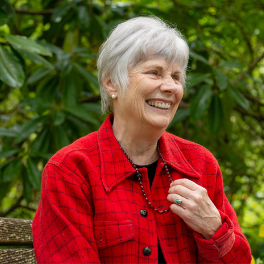 “This,” says Jan, opening her arms to the Garden, “is a place of vitality, growth, transformation. The trees are a living memorial — a way for us to have a living relationship with people who are no longer physically present.”
“This,” says Jan, opening her arms to the Garden, “is a place of vitality, growth, transformation. The trees are a living memorial — a way for us to have a living relationship with people who are no longer physically present.”Read about Jan Miko’s experience adopting trees at VanDusen Botanical Garden, and learn about how you can participate in the Adopt-a-Tree program. Read more!
To donate click here!
For more information on our Adopt-A-Tree programs please contact Milo Dron, Senior Development Officer at mdron@vandusen.org or by phone at (250) 397-0390.
-
+-Planting Seeds for our Teaching Garden
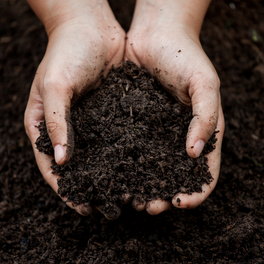 VBGA is excited to be working with Vancouver Park Board to create a fully accessible Teaching Garden within VanDusen Botanical Garden. Recently approved for development by the VBGA Board of Directors, the Teaching Garden will provide a much-needed accessible space for hands-on learning in gardening, science, and plant-based literacy through education programs, events, and activities.
VBGA is excited to be working with Vancouver Park Board to create a fully accessible Teaching Garden within VanDusen Botanical Garden. Recently approved for development by the VBGA Board of Directors, the Teaching Garden will provide a much-needed accessible space for hands-on learning in gardening, science, and plant-based literacy through education programs, events, and activities.Throughout Metro Vancouver our local habitats are decreasing as a result of urbanization. This causes stress on native plants, pollinators and populations. As a living laboratory, the Teaching Garden will increase awareness of this issue, and will highlight the inter-connectivity of life to students.
According to Chantal Martin, VBGA’s Director of Education “The Teaching Garden represents the first time that program participants can practice hands-on gardening skills in the dirt as they engage in environmental exploration and gain a more meaningful understanding of how we can all contribute to the sustainability of our planet.”
In addition, the Teaching Garden will serve as an example for schools, supporting them to create their own gardens. We will use the space to show teachers how to build a garden in a way that promotes biodiversity and demonstrates the importance of native species. Our hope is to inspire future projects in environmental education around British Columbia and Canada in order to support our local ecosystem and natural world.
To donate click here!
For more information or to donate to our Teaching Garden, please contact Milo Dron, Senior Development Officer at mdron@vandusen.org or by phone at (250) 397-0390.
-
+-Supporting and Welcoming All Children!
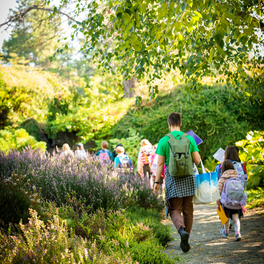 Since 2019, VBGA summer camps have hired a Special Needs and Inclusion camp leader. VBGA created this position in response to campers who are eager to participate, but experience barriers to their camp experience success. These leaders ensure children enjoy a successful camp experience through meeting all of their needs – including medical, emotional, mental, and physical.
Since 2019, VBGA summer camps have hired a Special Needs and Inclusion camp leader. VBGA created this position in response to campers who are eager to participate, but experience barriers to their camp experience success. These leaders ensure children enjoy a successful camp experience through meeting all of their needs – including medical, emotional, mental, and physical.This year’s Special Needs and Inclusion leader was Jocelyn Hashimoto. With a Bachelor’s degree in Child and Youth Care, Jocelyn started working at VanDusen’s summer camps in 2020 as a junior counsellour. From the beginning, she admired the work of the Special Needs and Inclusion leader because the role caters to children who have specific needs and works to understand the root of their challenges and connect with them. She strives to find key moments to work with campers and bring them out of their shell as they discover the Garden.
“If you can support campers to become aware of their surroundings can really help them to become aware of their surroundings, it can really help. For example, we have so many different types of birds that they may not have heard before. So we try to ground them and get them ready for being in this environment.”
Jocelyn appreciates VBGA’s approach to support every child where they are. “Especially after COVID, a lot of campers were so used to being inside, with their parents or watching TV. So the idea was to slow things down for them and take time to explore the Garden. I take time to get to know their interests and connect it to what they might be learning throughout the day or to their craft.”
More than ever, we know how important it is to provide different options for each individual child. Jocelyn believes VBGA’s unique environment offers something beyond the standard summer camp experience. “We prioritize being outside more than anything. Some kids come in afraid of bugs, but at the end, we are able to get them to pet a worm or pick up a snail. I think we offer a program that really helps young people embrace nature. Even if they don’t want to do everything, we are able to keep them engaged and spark interest in nature.”
To donate click here!
For more information or to donate to our Children’s Programs, please contact Milo Dron, Senior Development Officer at mdron@vandusen.org or by phone at (250) 397-0390.
-
+-Feathers and Leaves at Bloedel Conservatory
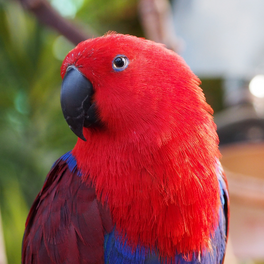 The Bloedel Conservatory is more than a conservatory, it is also an aviary. This tropical ecosystem is home to some 500 species of plants, shrubs and trees, as well as hundreds of free-flying smaller birds as well as several larger ones on perches throughout the facility.
The Bloedel Conservatory is more than a conservatory, it is also an aviary. This tropical ecosystem is home to some 500 species of plants, shrubs and trees, as well as hundreds of free-flying smaller birds as well as several larger ones on perches throughout the facility.Inviting pathways and helpful signage make it easy for visitors to explore the Conservatory on their own. But visitors always have another option: at any moment they can turn to a roving Docent and learn more.
The core objective of this volunteer program is to help ensure a rewarding experience for every visitor. While Docents are highly trained and pursue on-going research, they offer visitors friendly conversation, not a lecture. Through that conversation, they engage with the visitors’ own curiosity and interests. They offer relevant data and anecdotes, tailor suggestions accordingly, and invite visitors to share their own expertise in return.
Docents, like visitors, have specialized interests. One docent jokes that her shift partner sends her the “feather questions” while she sends him the “leaf questions.” Recently she and a teenager compared notes. She told him where to find the Guinea Turoca and the Golden Pheasants; he showed her his photos of the Arboreal Dove and the Peking Robin.
Docents value these exchanges as much as their visitors. “I am grateful to have the opportunity not only to share knowledge about our wonderful birds and plants,” one wrote in a memo shared with colleagues, “but also to have a positive impact on many lives — and they on mine — while doing so.
To donate click here!
For more information or to donate to our Volunteer Programs, please contact Milo Dron, Senior Development Officer at mdron@vandusen.org or by phone at (250) 397-0390.
